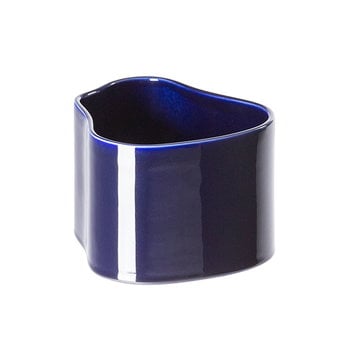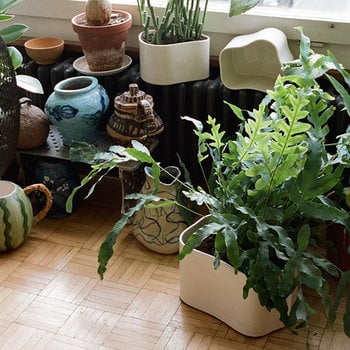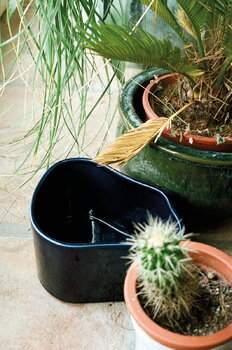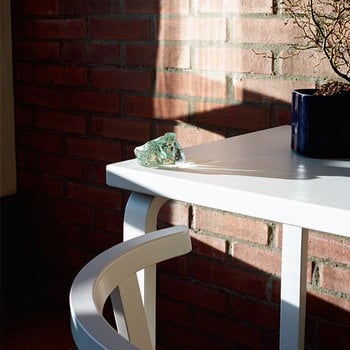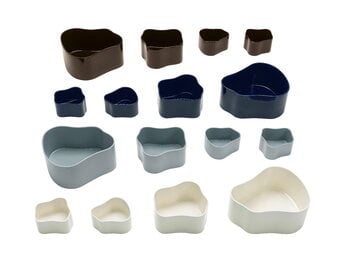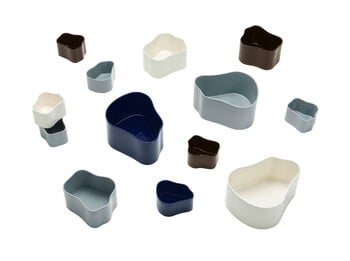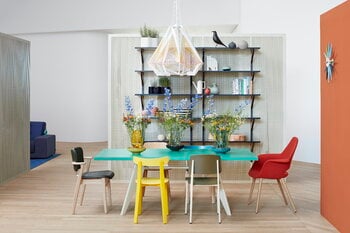|
The Riihitie plant pots, designed by Aino Aalto for the family’s home in Helsinki, were part of the collection the Aaltos presented at the Paris World Fair in 1937. 80 years later, Artek launched the ceramic planters, named after the street address of their original setting, in celebration of the centenary of Finland’s independence. The Riihitie plant pots are handcrafted, and the blue and white colour were inspired by the ceramic tiles of the Muuratsalo Experimental House, also known as the family's summer retreat. The organic, undulating design of the pots reflects the Aaltos’ close connection to nature. |
Riihitie plant pot A, small, blue gloss
Artek
Description
|
The Riihitie plant pots, designed by Aino Aalto for the family’s home in Helsinki, were part of the collection the Aaltos presented at the Paris World Fair in 1937. 80 years later, Artek launched the ceramic planters, named after the street address of their original setting, in celebration of the centenary of Finland’s independence. The Riihitie plant pots are handcrafted, and the blue and white colour were inspired by the ceramic tiles of the Muuratsalo Experimental House, also known as the family's summer retreat. The organic, undulating design of the pots reflects the Aaltos’ close connection to nature. |
Product details (6)
- Material
- Glazed ceramic
- Colour
- Blue
- Length
- 20.5 cm
- Width
- 16 cm
- Height
- 12 cm
- Notes
- No drainage hole in the bottom. Suitable for indoors only. Two designs available in three sizes.
- Product ID
Designer
Aino Aalto (1894-1949) was a well-known Finnish architect and designer. She studied architecture at the Helsinki University of Technology like her husband, the famous Alvar Aalto. In 1923 she went to work at the office of Gunnar A. Wahlroos, Jyväskylä, and switched to Alvar Aalto's office the following year.
Read moreReviews (1)
5
Based on 1 reviews
-
S
STYLIANOS K
Greece
Unique design, lovely color. Have the middle size as well and look nice as a pair
299 days ago
Sustainability
The Product Sustainability Framework, our criteria of sustainable design, helps you find the most sustainable products in our selection. Read below which sustainability criteria this product has met.
Working conditions & labour 7/9
-
Equal opportunities for all employees
-
Commitment to UN Global Compact, fair compensation for all employees
-
Corporate responsibility requirements defined and communicated for suppliers
-
Systematic work for improved inclusion and well-being in the workplace
-
Transparent supply chain
-
Suppliers' compliance to a code of conduct ensured
-
Compliance to the UN Guiding Principles on Business and Human Rights ensured in the supply chain
Eco-friendly production 7/9
-
Fair and resource-wise water-use in production
-
No incineration or landfilling of returned items
-
No use of endangered species as materials
-
No direct environmental emissions or waste (excl. GHGs) from production
-
Production and material sourcing that respect biodiversity, animal rights, and natural ecosystems
-
Material-efficient and ecological packaging
-
No potentially harmful chemicals used in own production
Climate impact 5/8
-
Company's direct greenhouse gas emissions identified and commitment to reduction
-
Product's carbon impact identified and commitment to reduction
-
Guidance on energy- and eco-efficient use of the product
-
Contribution to climate initiatives beyond the brand’s direct operations
-
100 % renewable energy in own production and operations
Sustainable materials 6/6
-
Sustainable and long-lasting material choices
-
No harmful or hazardous substances
-
Responsible raw material sourcing and production
-
Materials suited for circularity: monomaterials, recyclable finishings, renewable or recycled contents etc.
-
Ecological materials: natural, biodegradable, recyclable or recycled contents
-
Outstanding materials in terms of innovativeness, responsibility, sustainability and circularity: local production or sourcing, 100 % recycled content, C2C-certification etc.
Circular design 5/5
-
High aesthetic quality promoting long-term use of the product
-
Technically durable product design and material choices
-
Design for enduring life-long quality
-
Design and support for product maintenance, repair and upgradability
-
Innovative circular design solutions: circular service system, resale platform, remanufacturing, collection of used products, etc.
